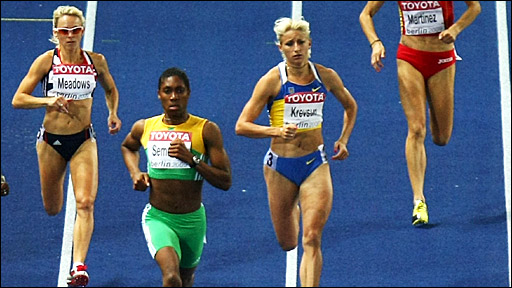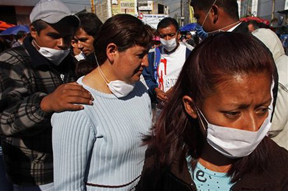Track Champion and Gender Controversy
Posted on August 25, 2009
Filed Under Women | Comments Off on Track Champion and Gender Controversy
 New world 800m champion Caster Semenya has shrugged off the gender controversy shrouding her victory at the World Championships in Berlin. The 18-year-old South African has been asked to take a gender test by athletics’ governing body the IAAF.
New world 800m champion Caster Semenya has shrugged off the gender controversy shrouding her victory at the World Championships in Berlin. The 18-year-old South African has been asked to take a gender test by athletics’ governing body the IAAF.
When a reporter asked Semenya about the rumours surrounding her gender following her victory on Wednesday, she said: “I have no idea about that.
“I don’t know who said that, I don’t give a damn about it.”
Spokesman Nick Davies said the IAAF had first asked the teenager to undergo a gender test after she posted a world leading time of 1 minute 56.72 seconds at the African junior championships in Bambous, Mauritius, at the end of July.
Davies said doctors in South Africa had already begun testing Semenya but because of the complexity of the process, it would be some time before the results were available. Until then, she was clear to run.
Controversy about the athlete then reached a head when she won Wednesday’s final in a time of 1:55.45, the best time in the world this year.
Semenya’s mother, Dorcus, told the BBC: “Caster is a girl, her birth certificate says she is a girl. This my girl, I give birth to that girl from my womb and I am not doubting.
“I know everything with Caster, no questions.”
John Wass, professor of endocrinology at Oxford University explained the basics of the gender verification test.
“There are three aspects to determine whether a person is a man or woman,” he told BBC Radio 5 live.
“The first thing is your chromosomal sex, you can scrape the inside of the mouth and get a few cells and that usually takes a fortnight or so – XX is a woman and XY is a man.
“The second is what you actually look like… you have a look to see what there is in terms of external genitalia.
“And the last aspect is what you feel you are.
“I think it is likely that the tests will be conclusive.”
The official IAAF policy document on gender verification states that one of the steps required for handling such cases is that “the athlete is referred to the investigating authority in confidence for further investigation and advice”.
The IAAF announced it had asked Semenya to take the gender test before she competed in Wednesday’s 800m final in Berlin.
Former Olympic heptathlon champion Denise Lewis described the treatment of the South Africa as “absolutely dreadful”, adding: “It’s awful she had to compete with this hanging over her head.
“It should have been sorted out much, much sooner than this.”
Four-time Olympic gold medallist Michael Johnson agreed, saying: “The consensus is that it is highly unfair and embarrassing to the athlete.”
But the American added: “At the same time we’ve had so many athletes who have doped over the last decade in this sport, so we know people will cheat for success.
“I think what the IAAF is doing is the right thing in terms of dealing with the situation, but the way they’re dealing with it is all wrong.”
Great Britain’s Jenny Meadows could have her bronze medal elevated to silver if Semenya fails her test.
She said: “There’s nothing we can do as athletes and it’s a difficult situation for Caster herself to be in but we’ve got to leave to to the discretion of the IAAF.”
Treatment of Semenya has caused anger in her native South Africa.
The country’s ruling party, the ANC, called on South Africans to rally around “our golden girl”.
“Caster is not the only woman athlete with a masculine build and the International Association of Athletics Federation should know better,” an ANC statement read.
Gideon Sam, president of South Africa’s Olympic governing body, said: “We condemn the way she was linked with such media speculation and allegation, especially on a day she ran in the final of her first major world event.
“We have every faith in Athletics South Africa and the team they selected to attend the World Championships in Berlin.”
Straight Men and Their Lesbian Best Friends
Posted on August 19, 2009
Filed Under Gay/Lesbian, Women | Comments Off on Straight Men and Their Lesbian Best Friends

It’s time to reconsider what we mean by friends with benefits. Hours after getting married, Evan Seplow, a 29-year-old mortgage broker from Long Island, hit a strip club with a close buddy. Seplow paid for several drinks and lap dances, and then the two retreated to the VIP room so his friend could get a private dance that was, Seplow says, “the whole nine.” The next day, when Seplow told his new bride about his escapades, she wasn’t angry or jealous, merely bemused. Seplow’s friend was Jen (not her real name), a woman who dates women—a fact that made all the difference to Seplow’s wife, as well as to Seplow. “That was pretty crazy—it might not be for the average person,” he says. “Then again, not many average guys have lesbian friends anyway.” click for more
How To Avoid The Swine Flu
Posted on April 27, 2009
Filed Under Health, International, United States | Comments Off on How To Avoid The Swine Flu
What is swine flu?
Swine flu is a type of influenza virus which normally affects pigs. But it has ‘crossed over’ to infect humans before, and the current strain of the virus has now affected many people in Mexico. The concern is that it seems to be spreading between people and might cause a wave of infections around the world.
There have been more than 1,600 cases of swine flu in Mexico in recent weeks, and over 100 deaths. But in other countries, where people travelling from Mexico have caught the disease, infections have been milder, and no-one has died. There have been confirmed cases in the US, in Canada and in Spain. Other suspected cases are being investigated in other countries.
What are the symptoms of swine flu?
Symptoms of swine flu are similar to those of normal winter flu. People have a feverish illness, along with one or more of the following symptoms: cough, sore throat, headache, tiredness and muscle aches. Some people also lose their appetite, and some have reported vomiting and diarrhoea.
What should I do if I get symptoms?
If you’ve been to Mexico or the US, or another country that may have been affected by swine flu, the UK’s Health Protection Agency says you should keep an eye on your health for the seven days after your return. If you develop flu-like symptoms during that time, you should stay at home, and contact your GP by telephone, or phone NHS Direct. Make sure you tell them where you’ve been travelling.
You may need tests, which might be carried out at home, or in hospital. Until you have your test results, you should avoid contact with other people. You should also take sensible hygiene precautions to avoid spreading the virus.
- Cover your nose and mouth when coughing or sneezing, use paper tissues and dispose of them straight away.
- Wash your hands frequently with soap and water.
- Wash surfaces like door handles with a normal cleaning product.
It’s important that your children also cover their noses and mouths when coughing or sneezing, and wash their hands frequently.
How can I protect myself against swine flu?
At the time of writing, there have been no confirmed cases of swine flu in the UK. However, it’s possible the virus will spread to the UK. Taking sensible hygiene precautions, such as those listed above, will help avoid spreading or catching the virus. Frequent hand-washing has been shown in clinical studies to prevent the spread of cold and flu viruses.
What treatments work for swine flu?
The anti-viral medicines oseltamivir (Tamiflu) and zanamivir (Relenza) are being used to treat people with swine flu. Testing has shown that the swine flu virus is susceptible to these medicines.
From:
Health Protection Agency. Swine influenza advice for the public. April 2009. Available at the Health Protection Agency (accessed on 27 April 2009).
« go back — keep looking »






